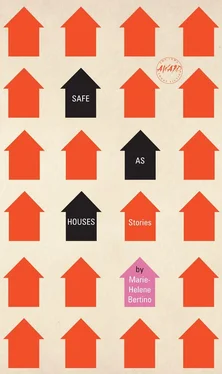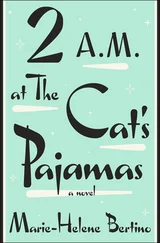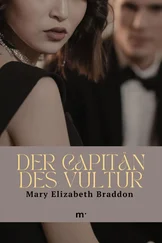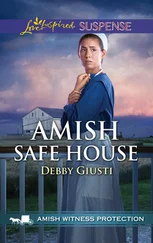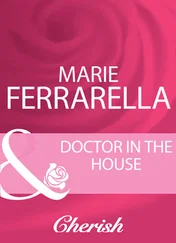…
Later Sister Helena makes a blindfold out of her small hands and leads me sightless to the courtyard.
She counts to three and pulls her hands away, and I am face to face with a garden of green tomato vines and one bashful tomato. “And there are buds everywhere.” She points. “Here, here, and here. There. There. A bunch on this side. Look.”
I hold the tomato in my hand. The color red is just occurring to it, having reached halfway down its green body. But it’s strong. You don’t have to be a gardener to know. This tomato has moxie. I bite into an apple.
Sister Helena folds her hands. “It’s a miracle.”
“I don’t believe in miracles,” I say.
“Yet there it is.”
…
Not long after, the tomatoes are cartwheeling from the vines. They swoon, they somersault, they enact big scenes.
“Now you’re just showing off.” I frown, but I’m proud and they know it. I tell them: I don’t think there is such a thing as luck. If there were such a thing as luck, tomato plants, I would be the unluckiest person on earth .
Consider my life.
Clive and I met at church; he was attending, I was asking directions to a bar. He spent five years as an attorney for a ridiculously named law firm before quitting to become a rodeo clown at Lone Star Steakhouse, reasoning a discount on Lone Star’s Frisbeesized steaks was more appealing than helping millionaires iron out their real estate problems. He dropped g ’s from his speech and added phrases like “no bigger than a minute” and “rat’s ass.” Twice during the dinner shift, Clive galloped out on a broomstick and performed tricks. He became lauded in the steakhouse circuit for his “leaning tower” trick, in which he encircled a patron, normally a woman eating a basket of steak bites, in a quivering column of rope. He left me for a waitress at Lone Star who posts pictures of herself on the Internet wearing nothing but a cowboy hat and chaps.
Being without Clive felt as absurd as seeing an ostrich counting exact change for the bus. Or an ostrich doing anything, anywhere. Ostriches are bizarre and unrealistic. I was so upset I couldn’t sleep, which I remedied by sleeping at work. Because of that and the Trix people, I lost my job writing commercials.
Unemployed, the most I could hope for in a day was that one activity would set off a domino effect: check mail, mail has catalog, call to order candlesticks made from found wood, operator has southern accent, pull down book on Louisiana, realize book is dusty, dust bookshelves, celebrate over glass of wine with no clear memory of how the afternoon’s activities had begun, knock head against coffee table, die.
I know it’s not cancer. But am I unlucky? Am I?
Clive says, You must must must stop calling me at work .
I hang up the phone.
…
Sister Helena and I sit near the glowing Teresa and throw tomatoes across the courtyard to the other roof.
“Will we go to hell for this?” I say when one hits the opposite wall and slithers into the courtyard.
Sister Helena is fifty-five and still a giggler. At first she reminded me of a saucer-eyed French movie star, then a Muppet, and now I’m back to a French movie star. Her left eyebrow is a miracle capable of expressing every human emotion.
“You have strange ideas about Catholics, Ruby.” She winds up and pitches her tomato. She has a surprisingly good arm.
I ask what it’s like being married to God.
“I feel protected and safe,” she says. “I don’t have to shave my legs.” The giggle again.
I stop, midwindup. “You don’t shave your legs?”
She shakes her head.
“Like, ever? You must have some growth. I’m just saying. When God gets home, you are going to have some serious maintenance to do.”
“I think God has more important things to think about.”
“Maybe,” I frown. “Maybe not.”
She asks if I pray and I say, “Praying is… involved.”
She says, “It’s like making a phone call.”
“A phone call to God.”
“I know you are saying that sarcastically but yes, a phone call to God.” She throws the last tomato and faces me. “Let’s make a phone call to God.”
I blink.
She holds her hand as a receiver. “Ring, ring,” she says.
I blink.
“Ring, ring.” She covers her pinkie, the “receiver.” “Answer the phone.”
I can’t do anything but blink. She keeps ringing. Finally, I answer.
“Ruby!” she says. “It’s God!”
“God,” I say, “where are you calling from?”
“Heaven!”
“You sure have a lot of explaining to do. There goes my other line.” I hang up.
“You can’t hang up on God,” she says. “Call him back.”
“Ring, ring,” I say.
Sister Helena pretends to do her nails. “Ring, ring,” I insist.
She answers her hand. “Hello?”
“God,” I say, “Ruby here.”
“How did you get this number?”
“Information,” I say. “You’re listed.”
“There’s my other line. So long!” She hangs up.
“You can’t hang up on me!”
“Just did.”
We sit for a moment in silence. Sister Helena seems pleased with herself.
I say, “Where do you ladies go on Friday night?”
She shrugs. “I’m glad you came, Ruby. Things are more fun now.”
“Don’t fall in love with me, Sister. I’m a runaround. A real slippery fish.”
“You talk like a gangster.”
A voice calls to us from the courtyard where Sister Luisa Nosy Pants stands with her hand shielding her eyes. “What are you doing up there?”
Sister Helena says, “Run.”
…
On First Fridays I escort the ducklings to mass.
The church at Saint Teresa was built when people still feared God. It is shaped like the business end of an arrow. Built to, in the event of apocalyptic quake, wrench free from the earth and rocket straight to heaven. Serious pews. Stained-glass windows throw colored lights onto our faces. Genuflecting, shaking hands: religious exercise. A lot of fuss. All this for me?
Maybe God gets nervous in places like this, the way I feel in restaurants with linen napkins, because if he does exist, I don’t feel him here.
Afterward I water the tomato plants. I tell them, I did not eat one apple today, not one . I hold a few of their bigger leaves, the exact size of my palms.
…
That night I am decoupaging a lamp when I hear scuffling in the hall. The sisters of Saint Joseph slip into their shoes. I run to the window and stand on the crate. Whispers, multishouldered shadow, gate click, and gone. I pace the floor. I wind a scarf around my neck and leap the stairs to the courtyard.
Don’t wait up for me, tomato plants!
The sisters shuffle up Route 1. I follow a spy’s distance behind, catching snatches of talking and singing. Summer is hanging on. The trees I pass showcase their leaves, gold and silver. Trucks’ high beams light me; I leap into a bush. When I climb out, the sisters have vanished. I look up, then down, the road. A billboard above me says Call Today! I run. Several yards ahead is a stucco building with a sign The Slaughterhouse Bar. Down the highway I hear the defeated bleating of a horn — a cutoff, a missed signal. I decide to go in, drink whiskey, and figure out how I was given the slip by twelve women of the cloth.
It’s a sawdusty local’s hole with pear-shaped men lining the bar. Walking through the vestibule I encounter a strange tableau — Sister Charlene feeding a bill into the beat-up jukebox. Fat Sister Georgia ordering beers and saying something I can’t hear to the bartender, a cute remark; he winks as he slides the tray to her.
Sister Helena is at the bar, sipping from a pint of beer. She notices me. “You have leaves in your hair.”
Читать дальше
